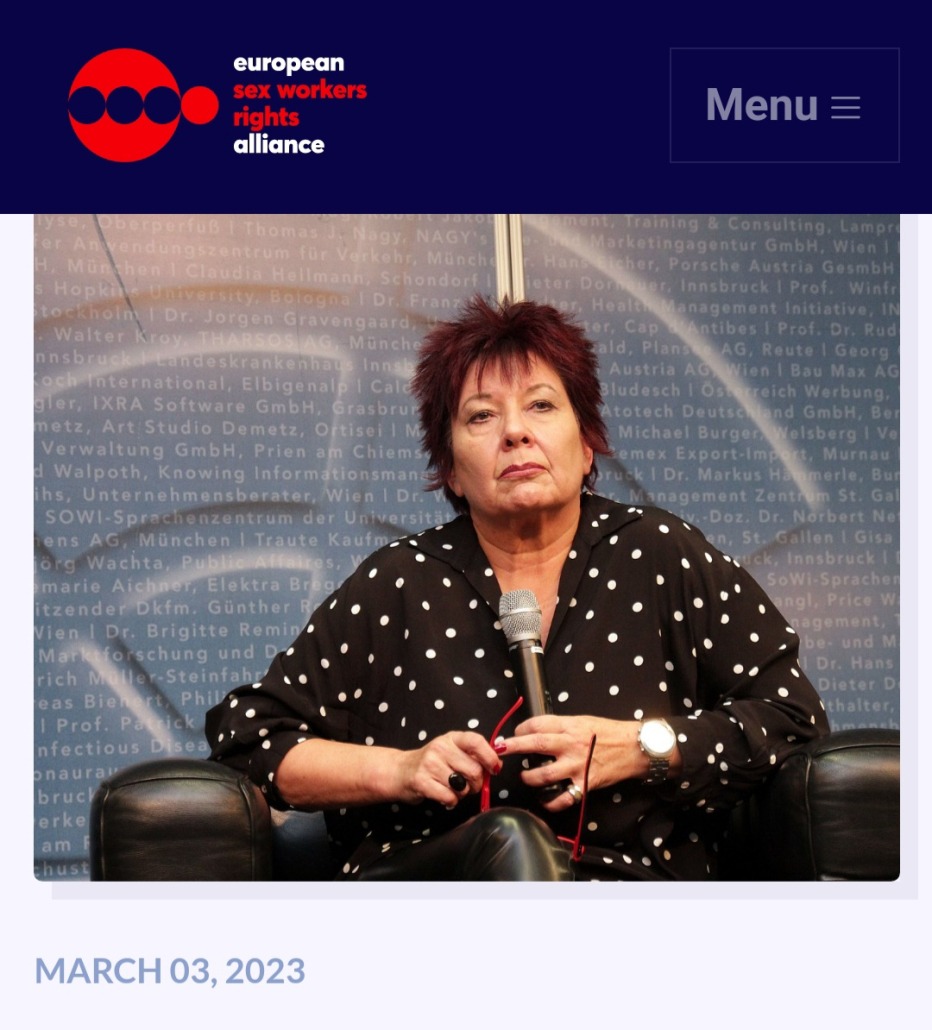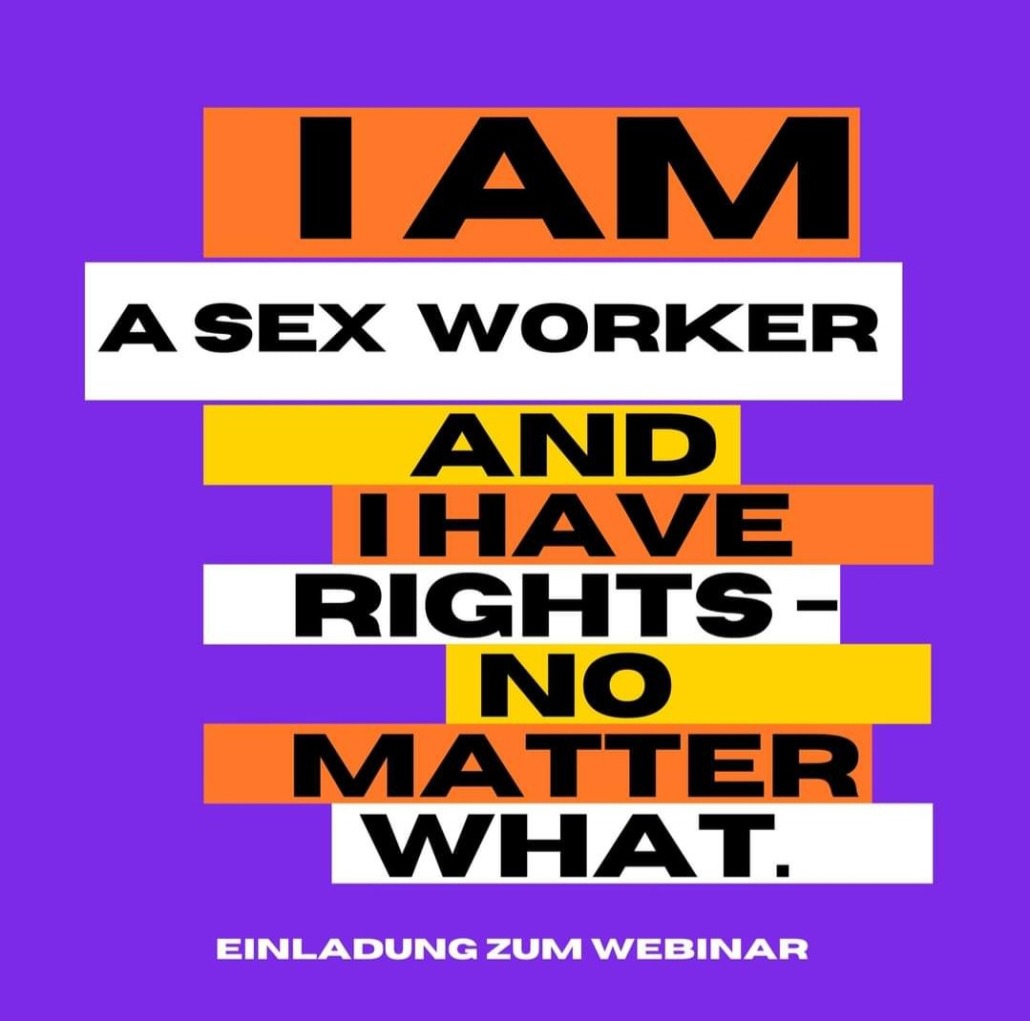Toller Artikel der european sexworkers rights alliance: Die großartige Helga Konrad über die Wichtigkeit von Entkriminalisierung:
To mark International Sex Workers` Rights Day on 3rd March, we are publishing the following speaking notes by Helga Konrad from the Round table discussion: Regulation of prostitution in the EU: its cross-border implications and impact on gender equality and women´s rights.
Why to oppose the so-called Nordic Model, also known as the Sex Buyer Law, (a legal approach to addressing prostitution that criminalises the purchase, but not the sale, of sexual services, which is based on the idea that prostitution is a form of violence against women and should be eliminated) and to focus instead on decriminalisation of sexwork:
- It can lead to most negative consequences, such as increased stigma and discrimination against sex workers, as well as pushing the industry underground, leading to the displacement of sex workers to more marginalised and dangerous areas, which can lead to increased risks and harm for them and making it more difficult for law enforcement to identify and prosecute perpetrators and protect sexworkers from violence and exploitation.
- There is no evidence that it reduces demand for prostitution – and it certainly does not
reduce human trafficking. This argument is incorrectly used to promote the acceptance of the Nordic Model, but these are at best fallacies of deliberations. Sex work and Human Trafficking for sexual exploitation are not the same thing and it is not serious to conflate them. While sex work is about the consensual and voluntary exchange of sexual services among adults for money, human trafficking for sexual exploitation, on the other hand, refers to the recruitment, transportation, transfer, harbouring or receipt of persons by means of threat, use of force or other forms of coercion, abduction, fraud, deception, abuse of power or vulnerability etc. It is important to note that some people who engage in sex work may have been trafficked, and that trafficking can take place within the sex industry – however, it is equaly important to recognise that not all sex workers are trafficked or victims of
trafficking and that criminalieing essential components of sex work make it harder for those who are trafficked to come forward and get help. - It is wrong and counterproductive to conflate violence and exploitation. Again, this argument is wrongly used to promote the implementation of the Nordic Model.
- The argument that the Nordic Model does not criminalise the sale of sexual services, but only the buyers of sexual services, shows clearly the lack of understanding of the complexity and interlinkages of the issue at large, and is more than hypocrite because it is evident from practice, where the Nordic Model has been implemented, that it is more difficult for sex workers to access support services, non-judgemental health services and protection from violence and abuse. It makes it harder for them to screen clients and work safety, and much more difficult for them to report abuse and trafficking. Under such conditions sex workers are more likely to accept dangerous and/or exploitative working conditions in order to avaoid being aprehended by the police.
- It does not address the root causes of why individuals may engage in sex work, such as lack of (job/employment) opportunities, lack of access to education, (gender) discrimination, poverty etc., and because it infringes on the sex workers’ rights of self-determination, autonomy and agency.
Arguments against the further implementation of the Nordic Model:
- It leads to stigmatisation and criminalisation of sex workers. This could make it more difficult for the them to access health care, social services, and legal protection.
- It pushes the sex industry underground, making it harder for authorities to monitor and regulate it. This could increase the risk of exploitation, trafficking, and violence for sex workers.
- It is difficult to enforce and may divert resources away from more pressing issues.
- It does not reduce demand for human trafficking or address the root causes of why people engage in sex work, such as lack of access to education and employment, gender inequality, poverty, etc.
- It infringes on the rights of individuals to make their own decisions about their bodies, and how they choose to sell their labour.
- It disproportionately affects marginalised groups, such as migrants and
LGBTIQ+ individuals, who may be more likely to engage in sex work due to discrimination and other barriers to economic opportunities. etc. etc.
Ensuring sex workers´ rights involves advocating for and supporting policies and laws that recognise and protext the rights of sex workers, and involves implementing policies and laws that protect and respect the rights of sex workers. This should include:
- Decriminalising sex work: This means removing criminal penalties for consensual adult sex work, which can help reduce the harms caused by criminalisation, such as violence and discrimination.
- Providing access to health care: This includes ensuring sex workers have access to safe, affordable and non-judgemental health care services, such as HIV prevention and treatment, as well as reproductive health services.
- Creating safe working conditions: This includes providing safe and secure housing for sex workers, and implementing measures to prevent violence and exploitation in the workplace.
- Recognising sex work as work: This includes recognising sex work as a legitimate form of labour and providing sex workers with the same rights and protections as other workers, such as access to labour laws and social protection.
- Supporting sex worker-led organisations: This includes providing financial and logistical support to sex workers organisations, which play a crucial role in advocating for and defending the rights of sex workers.
- Challenging stigma and discrimination: This includes educating the public and policymakers about the realities of sex work and the importance of respecting the autonomy and agency of sex workers, and challenging the discrimination and stereotypes that sex workers often face.
- It is essential to conduct evidence-based research, to continuously evaluate and adapt policies to ensure they are meeting their intended goals, namely, to improve the lives of those affected.
- And last, but not least, it is important to listen to the voices of sex workers.
I advocate for the full decriminalisation of sex work, which would remove criminal penalties for consensual adult sex work and allow sex workers to operate openly and safely. This would improve the rights and safety of sex workers, and would make it easier for them to report abuse and trafficking.
Helga Konrad is an Austrian politician and widely considered an expert on anti-trafficking. From 2000 until 2004 she led a Stability Pact for South Eastern Europe task force against human trafficking, and in 2004 was appointed as the Organisation for Security and Co-Operation in Europe’s special representative for the issue. She is also a member of the Social Democratic Party of Austria (SPÖ).
Quelle: https://www.eswalliance.org/in_support_of_decriminalisation_notes_from_helga_konrad
Liebe Leute, ich darf euch noch eine wichtige Veranstaltung zur Kenntnis bringen! Die großartige Christine Nagl von PiA Salzburg referiert am 24.03. im NiG über die Auswirkungen der Kriminalisierung von Sexarbeit in Europa. Hier die Ankündigung des queer sexworkers collective:
Das queer sex workers collective lädt zusammen mit der HUS zum Vortrag mit Diskussion ein: “Auswirkungen der Kriminalisierung der Sexarbeit in Europa”. Mit Christine Nagl von der Beratungsstelle PiA.
Verhüten, bekämpfen; schützen, unterstützen: diese Worte werden laut (und stolz) ausgesprochen, wenn es um Gesetze und Maßnahmen geht, die die Sexarbeit kriminalisieren. Da wird „ein Ende gemacht“, Betroffene können, so heißt es, Hilfe erwarten und Unterstützung beim Ausstieg erhalten. Das „Schwedische“ oder „Nordische Modell“ wird in immer mehr europäischen Ländern gesetzlich verankert und als Schritt gefeiert, der Gewalt gegen Frauen an einem neuralgischen Punkt reduziert.
Aber wie sieht die Wirklichkeit aus? Wirkt sich das Modell tatsächlich positiv aus, auf jene, die Sexarbeit anbieten (müssen)? Ganz und gar nicht, sagt Christine Nagl. Und sie muss es wissen: Seit über 20 Jahren engagiert sie sich für Menschenrechte, insbesondere im Bereich der Sexarbeit – u.a. in der Arbeitsgruppe Prostitution des Bundeskanzleramts, beim Projekt PiA (einer Beratungsstelle für Sexarbeiter*innen) und als ehemaliges Vorstandsmitglied des Vereins sexworker.at. Sie beobachtet es täglich: Wird Sexarbeit kriminalisiert, führt das zu einem deutlichen Mehr an Gewalt und Gefahr für alle Beteiligten. Und der propagierte Ausstieg ist längst nicht so einfach wie gerne behauptet wird.
Woran das liegt, worin der Denkfehler jener besteht, die sich – auch in Österreich – für das schwedische Modell stark machen, und wie ein anderer, deutlich besserer Umgang mit Sexarbeit aussehen könnte, erklärt Christine Nagl in ihrem Vortrag. Fragen sind willkommen, nach dem Vortrag gibt es ausreichend Zeit für Diskussion.
Ort: Neues Institutsgebäude (NIG) Wien, Hörsaal II.
Zielgruppe: Beteiligte und Interessierte, aber auch alle, die sich nach gutem Diskurs sehnen, weil ihnen Schwarz-Weiß-Lösungen und Law and Order zunehmend gegen den Strich gehen.
Liebe Leute, bitte teilt in euren Socials dieses Webinar und meldet euch an! Es geht um Großes, nämlich die Zukunft der Sexarbeit in der EU.
Hier der Einladungstext zum Webinar von Monika Vana MEP:
Liebe Interessierte!
Ihr seid herzlich eingeladen zum Webinar “I am a sex worker and I have rights – no matter what!”
Im Europaparlament wird gerade ein Bericht zu Regulierung von Prostitution heiß diskutiert: Was muss/kann und soll die Europäische Union für die Rechte von Sexarbeiter:innen tun? Als Shadowrapporteurin für Greens/EFA setze ich mich gemeinsam mit NGOs und Expert:innen für die Rechte von Sexarbeiter:innen ein.
Ich freue mich darauf mit
Meri Disoski, Bundesfrauensprecherin der Grünen und Vorsitzende der Grünen Frauen Österreich
Maria Hörtner, Mitarbeiterin in LEFÖ-TAMPEP – Beratung und Gesundheitsprävention für Migrantinnen* in der Sexarbeit
und Thorja von Thardor, sexworker.at
über aktuelle Entwicklungen zur Regelung von Sexarbeit auf EU Ebene und in Österreich zu diskutieren, welche feministischen Herausforderungen der Bereich mit sich bringt (von Entkriminalisierung bis zur Kritik am „Schwedischen Modell“) und wie die Rechte von Sexarbeiter:innen gestärkt werden können.
Wann: am 20. März von 16:30 – 18:00 Uhr
Wo: Webinar auf Zoom
Nach der Anmeldung erhaltet ihr in der Mail zur Auftragsbestätigung den Link zur Veranstaltung (ganz nach unten scrollen!).
Wir freuen uns auf euch!
Anmeldung:
Vielen Dank fürs Teilnehmen, Weitererzählen und Teilen! ❤️
Gestern, heut, das ganze Jahr
Dich verschlingen, mit Haut und Haar
Dich fühlen, riechen und auch schmecken
Dein Schwanzlöchlein – mit Mund und Fingern necken
Ja, ich will ganz tief mich neigen
Mein ganzer Leib ist dir zu eigen
Du verzauberst, quälst mich auch
Mit dem Feuer unter deinem Bauch
Halt mich mit den Lippen fest
Bis der Atem mich verlässt
Dich heiß auf meine Brüste legen
Im Anus wär dein Schwanz ein Segen
Ich will dein trefflich Spielzeug sein
Oder auch ein Haar an deinem Bein
Am besten fest mit dir verwachsen
In der Höhle deiner Achseln
Ständig saugen, an dir lecken
Mich unter deine Vorhaut stecken
Dein Same ist das Labsal mir
Schwüle Qual voll Lust und Gier.
(c) Thorja 2023 ♥️☺️
Journalvorschau
 This could be your view30. April 2024 - 1:21
This could be your view30. April 2024 - 1:21 Des Filfs mächtige Ejakulationen23. April 2024 - 23:23
Des Filfs mächtige Ejakulationen23. April 2024 - 23:23 Auf halbem Wege zu Normal23. April 2024 - 2:12
Auf halbem Wege zu Normal23. April 2024 - 2:12 Keine Buchungen 03.-20.04.28. März 2024 - 15:25
Keine Buchungen 03.-20.04.28. März 2024 - 15:25 Auf Erkundung10. März 2024 - 19:29
Auf Erkundung10. März 2024 - 19:29 Fassungs-los5. März 2024 - 0:00
Fassungs-los5. März 2024 - 0:00 Lass mich dich vulgär berühren23. Februar 2024 - 6:00
Lass mich dich vulgär berühren23. Februar 2024 - 6:00 Versink in mir21. Februar 2024 - 22:29
Versink in mir21. Februar 2024 - 22:29 Lights Out21. Februar 2024 - 21:08
Lights Out21. Februar 2024 - 21:08 Neues Angebot: Kultur-Specials3. Februar 2024 - 13:41
Neues Angebot: Kultur-Specials3. Februar 2024 - 13:41













